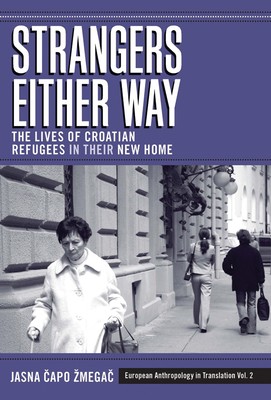
- We will send in 10–14 business days.
- Author: Jasna Čapo Zmegač
- Publisher: Berghahn Books
- ISBN-10: 1845453174
- ISBN-13: 9781845453176
- Format: 15.2 x 22.9 x 1.4 cm, kieti viršeliai
- Language: English
- SAVE -10% with code: EXTRA
Reviews
Description
Croatia gained the world's attention during the break-up of Yugoslavia in the early 1990s. In this context its image has been overshadowed by visions of ethnic conflict and cleansing, war crimes, virulent nationalism, and occasionally even emergent regionalism. Instead of the norm, this book offers a diverse insight into Croatia in the 1990s by dealing with one of the consequences of the war: the more or less forcible migration of Croats from Serbia and their settlement in Croatia, their "ethnic homeland." This important study shows that at a time in which Croatia was perceived as a homogenized nation-in-the-making, there were tensions and ruptures within Croatian society caused by newly arrived refugees and displaced persons from Serbia and Bosnia and Herzegovina. Refugees who, in spite of their common ethnicity with the homeland population, were treated as foreigners; indeed, as unwanted aliens.
EXTRA 10 % discount with code: EXTRA
The promotion ends in 22d.04:15:07
The discount code is valid when purchasing from 10 €. Discounts do not stack.
- Author: Jasna Čapo Zmegač
- Publisher: Berghahn Books
- ISBN-10: 1845453174
- ISBN-13: 9781845453176
- Format: 15.2 x 22.9 x 1.4 cm, kieti viršeliai
- Language: English English
Croatia gained the world's attention during the break-up of Yugoslavia in the early 1990s. In this context its image has been overshadowed by visions of ethnic conflict and cleansing, war crimes, virulent nationalism, and occasionally even emergent regionalism. Instead of the norm, this book offers a diverse insight into Croatia in the 1990s by dealing with one of the consequences of the war: the more or less forcible migration of Croats from Serbia and their settlement in Croatia, their "ethnic homeland." This important study shows that at a time in which Croatia was perceived as a homogenized nation-in-the-making, there were tensions and ruptures within Croatian society caused by newly arrived refugees and displaced persons from Serbia and Bosnia and Herzegovina. Refugees who, in spite of their common ethnicity with the homeland population, were treated as foreigners; indeed, as unwanted aliens.


Reviews